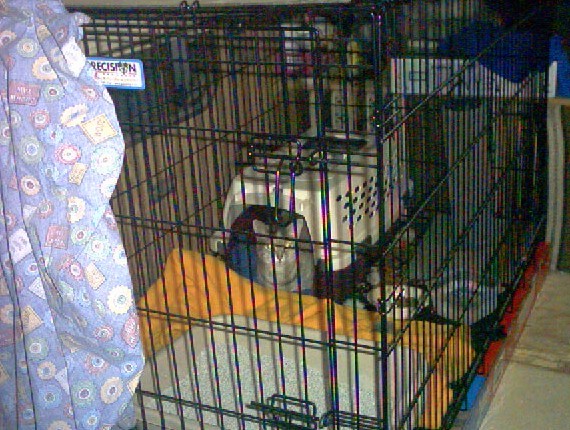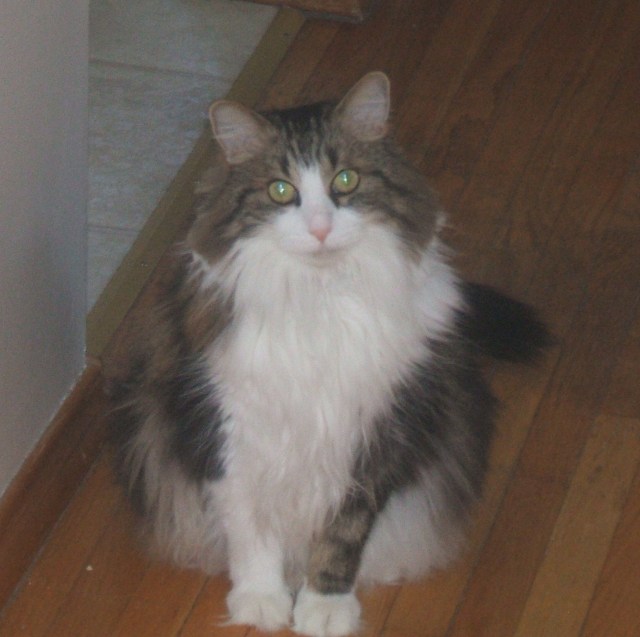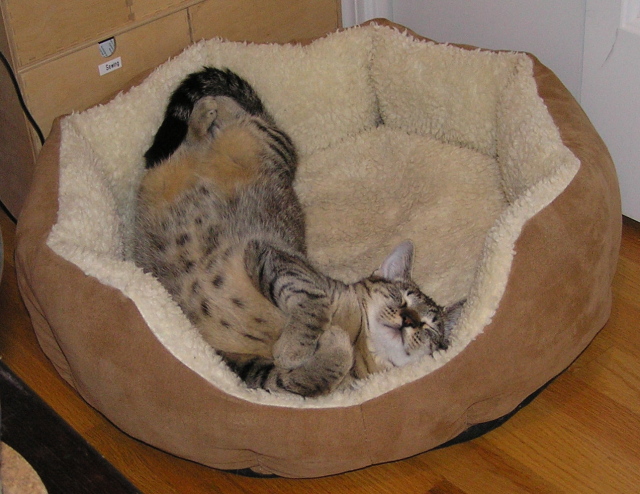QuestionAbout a year ago, I moved in with my fiance and his 2 cats (a male and a female). This meant that they would finally meet (and live with) my 3 cats (a male and 2 females). We read up on this and tried to do it in the least stressful way possible for all of them - started by cloistering my 3 cats in one room and later, letting them out while his 2 cats stayed in the room. Gradually we let them have more freedom and eventually all 5 were out and about and together. There were some occasional disagreements, fights, etc., but nothing that ever scared us, they seemed to be getting along pretty well, the 2 boys would even play together and they were the ones I was most worried about. Later, I don't remember exactly when it began, but we started noticing that someone was peeing outside of the litterbox. At first it was confined to just right next to the litterbox, then it became other areas of the bathroom and the shower. Later, it happened in the kitchen and on the living room rug. We soon realized that it was my male cat who was doing this. We tried all kinds of things - keeping the litterboxes as spotless as possibly, scooping them multiple times a day, etc., getting rid of all things that he had peed on that we were unable to clean thoroughly (rugs), using special cleaning solutions to get rid of the odor, etc - but nothing seemed to work (I've read that you are supposed to have 1 litterbox for each cat, plus 1 extra, but we have a very small house and I am clueless as to where we would put that many boxes - we have 1 in each bathroom right now). Finally, feeling very desperate and sick of cleaning up urine, I decided to put him by himself, with his own litterbox, food, and water, in a spare bedroom. The problems pretty much stopped (and only once recurred, when I got him a covered litterbox, I took the cover off and there were no further incidents). I am at a loss about what to do. When I lived on my own with just my 3 cats, there were no major problems. Occasionally, there would be some pee next to a litterbox, but nothing like it this. The only thing I can think of is that he doesn't like peeing in a litterbox that another male cat has used. Obviously, he can't live the rest of his life in the bedroom (he's been in there for about 2 months now, doesn't seem to really mind too much). I thought about giving him away, but the idea makes my heart break and to make matters worse, I can't find anyone to take him because he also has feline asthma and no one wants to adopt a kitty with a medical condition (even though it is well controlled and he is the most loving, sweet boy you'll ever meet!). I should also mention that all of the cats are spayed/neutered and were adopted as adults from shelters or as strays off the street. If there's anything I've left out, please let me know. I'm hoping that you'll be able to think of something that I haven't, thanks for reading this and for trying to help!
AnswerKaren,
The most common reason for the male's behavior is a urinary tract infection or urinary crystals. Both are painful and the cat associates the pain with the litter box and goes elsewhere. It can be treated with medication. If not caught in time it can cause a complete blockage which is nearly always fatal in a male cat. Or, he could have kidney problems. If you can afford it, I would have him checked by a vet. I would rule out a medical issue before dealing with his actions as a behavioral problem.
I have had many cats, and I have never had one litter box per cat! The most I've ever used is two for any number of cats. You just need to clean them more often, but using a clumping litter like Tidy Cat, Fresh Step, etc. makes it easy and odorless. Using a larger litter box and deeper litter sometimes helps.
Since I cannot put all the information on behavioral reasons for the cat peeing outside the litter box in this reply, I am including some links to good articles about improper elimination. They will have good information that you should find helpful in dealing with your cat's behavior.
(copy and paste or type the whole links into your address bar)
http://www.catsinternational.org/articles/housesoiling/unabridged_litterbox_1.ht...
http://cats.about.com/cs/behavioralissues/a/outsidebox_two.htm
http://www.geocities.com/heartland/pointe/9352/litterboxhelp.html
http://www.apbc.org.uk/article10.htm
AND,
here is a 'recipe' for cat urine odor removal:
1 quart of 3% hydrogen peroxide
1/4 cup baking soda
1 teaspoon of liquid soap
(3% hydrogen peroxide can be bought at most grocery and drug stores in pint and quart bottles).
Gently mix all ingredients in a non-metal container. Do not mix or shake vigorously!
The mixture is best used when fresh but can be stored. Do not keep mixture in an airtight container. Have a VERY loose lid as baking soda and hydrogen peroxide when mixed together will release oxygen and an airtight container will explode. You can mix and keep it in large spray bottle (Home Depot, etc.) but a plastic liter or 2-liter soda bottle works just a well.
Always test for color-fastness. Hydrogen peroxide is a bleaching agent in stronger concentrations and can lighten materials that are not color-fast.
CLOTHING, COMFORTERS, AND BEDDING:
Put the items in the washing machine and pour in enough of the recipe to cover thoroughly. This might take a few gallons depending on the size of the load. Soak for at least 24 hours. Rinse and rewash using normal washing detergent. If any of the odor is still present, soak again for 24 hours, rinse and rewash.
A small area on a comforter can be spot treated by saturating the area thoroughly, letting it dry for 24 hours, then washing the comforter normally in the washer with detergent. Always check for color-fastness before using.
MATTRESSES, SOFAS, PILLOWS
For mattresses you must saturate the spot thoroughly to get deep down into the padding and springs to neutralize the urine. If the cat has urinated alot in one spot, the mattress can be soiled all the way to the other side! Let the area dry for 24-48 hours without bedding then reapply if necessary.
For sofas the same directions as above apply but always check for color-fastness in a hidden area before using. Cotton is used in alot of upholstery fabrics and is easily bleached. If your sofa pillow cushion covers can be unzipped and taken off (must be color-fast and washable) you can put them in the washing machine. See How to Remove from Clothing, Comforters and Bedding for instructions.
HOW TO REMOVE CAT URINE ODOR FROM CARPETS
FOR INDIVIDUAL URINE SPOTS ON CARPET:
If fresh, sop up as much cat urine as you can with a paper towel first. Use a spray bottle to saturate the spot completely with the recipe - do not blot. The recipe must penetrate the padding and possibly the floor boards underneath, where the urine has penetrated for it to work.
Wait 24-48 hours until dry then vacuum. If the urine odor is still present - repeat the procedure. It usually takes 2-3 applications to completely neutralize the cat urine odor.
FOR LARGE AREAS OF CARPET:
You can use a carpet cleaning machine - one of your own or a rental and use the recipe instead of the shampoo. You will have to make several gallons of the recipe depending on the size of the carpet. Don't use the vacuum part of the machine - you will want to let the solution soak and dry for 24-48 hours before vacuuming.
Most carpet cleaning machines are not made for this use, and baking soda can clog the nozzles of the machine so use caution. Instead, you can use a 1 gallon garden bug sprayer (Home Depot, etc.). Rinse the nozzle out frequently by filling the tank with hot water and spraying it in the bathtub until the nozzle is clear.
If using the sprayer saturate the entire carpet with the recipe, let dry for about 24-48 hours and vacuum. You will have to probably repeat the procedure again. Where heavily saturated with old urine it may take 3 applications over a week.
Also, if the cat urine is old and dried, the smell will probably be worse a day or two later. This is because you are rehydrating the uric acid crystals in the urine to neutralize them. The smell will get better with each application.
I hope this helps! I know it is frustrating to have cats who don't use the litterbox!
Tabbi

 my cat is behaving out of sorts
QuestionQUESTION: hi
i recently moved, and whereas my c
my cat is behaving out of sorts
QuestionQUESTION: hi
i recently moved, and whereas my c
 rude kitty
Question
6 year old tabby, Budd
My cat is a 6 year old
rude kitty
Question
6 year old tabby, Budd
My cat is a 6 year old
 cat scared of everything
Question
Hugo Hugo
Hi,
I have a 2.5 years
cat scared of everything
Question
Hugo Hugo
Hi,
I have a 2.5 years
 I dont understand my cat!
QuestionOliver
QUESTION: In January 2009 I got a
I dont understand my cat!
QuestionOliver
QUESTION: In January 2009 I got a
 Change in cat behaviour
QuestionCurry, before kittens
QUESTION: Hi Shant
Change in cat behaviour
QuestionCurry, before kittens
QUESTION: Hi Shant